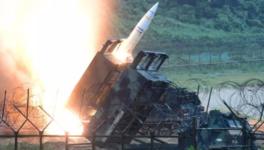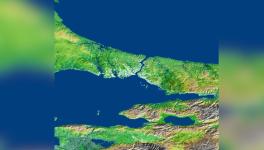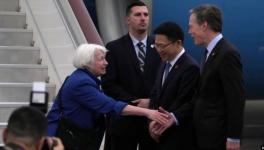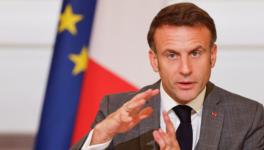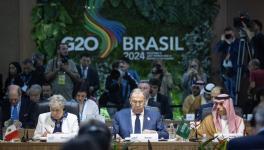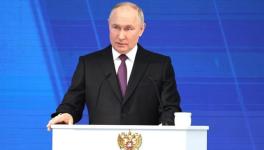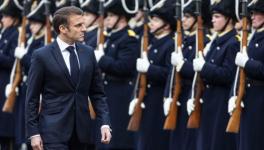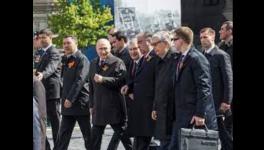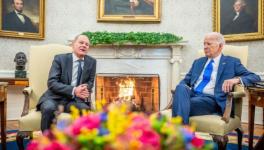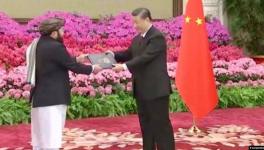Peace Talks in Syria Bogged Down Due to Saudis
The deadline for the start of the UN sponsored Syrian peace talks in Geneva was 25th January. It has now been postponed to the 29th as there have been serious disagreements between Syria, Turkey and Saudi Arabia about who will represent the opposition to the Assad government. The original agreement, reached on …, identified the two groups which would not be part of the peace talks – the Islamic State (IS) and Jabahat al Nusra, which is affiliated to al Qaeda. But it set aside the thorny question of who will be at the table, to be worked out by Staffan de Mistura, the UN Special Envoy for Syria, and other members of the International Syria Support Group (ISSG)
Predictably, Turkey and Saudi Arabia differ with the Syrian government on the matter of whom to invite. The Saudis insist that only those groups that were a part of the Riyadh consultations carried out under the Saudi aegis should be considered part of the opposition. Turkey is opposed to the participation of the YPG, the Kurdish group that has fought the IS in northern Syria, because it believes it is allied to the PKK in Turkey. The PKK was designated a terrorist group by the Turkish government, a designation that has been endorsed by the US although it is itself in tacit alliance with the YPG. The Syrian side opposes the inclusion of Mohammed Alloush, who leads the sectarian and Salafist Jaish al Islam, as the “chief negotiator” for the rebels, and would like to include the YPG and other opposition forces that are outside the Syrian government; hence the deadlock.

Saudi intransigence has been the key problem in the talks. Foreign Policy, the leading policy journal from the US reports that the UN Envoy Staffan de Mistura, in his confidential briefing to the UN Security Council on January 18th, held that “Riyadh is complicating efforts to find a diplomatic solution to the Syrian conflict by trying to tightly control which opposition groups will be allowed to participate in the negotiations.”
The Riyadh meeting last month produced a Saudi backed “High Negotiations Committee” (HNC), which believes that only the HNC represents the “opposition” to the Assad government. It is this demand for exclusivity and a refusal to accept any other group outside the HNC that is complicating de Mistura's efforts to start the peace talks. Apart from Saudis, the HNC also appears to have the support of Turkey, France and other Gulf monarchies.
Russia has also objected to the composition of the HNC delegation. The key problem is with including the Jaish al Islam, a hardline Salafist outfit virtually indistinguishable from Jabahat al Nusra and Ahrar al Sham, which are its two allies in the Jaish al Fatah front. Jabahat al Nusra is the Syrian affiliate in Syria while Ahrar al Sham has roots in al Qaeda and the Muslim Brotherhood. Jaish al Islam has a strong presence around Damascus and was led by Zahran Alloush till his death in a Syrian airstrike last December. Zahran Alloush and his outfit had imprisoned Alawi women civilians in cages and placed these in strategic locations in East Ghouta to deter Syrian and Russian airstrikes. Alloush also propagated an Islamic state and the “cleansing” of all Shias and other “apostates” from Syria. Mohammed Alloush, his successor in Jaish al Islam, is his cousin and has been chosen chief negotiator.
The US and Russia have been talking to each other and to de Mistura. Their suggestion – yet to be accepted by both the sides – is to have three parties involved in negotiations: the Syrian government; the groups the Syrians want to include but which are opposed by Turkey and Saudi Arabia; and finally those that Turkey and the Saudis want. De Mistura has proposed “proximity talks” to start the peace process, in which interlocutors including himself would circulate between the three groups and try to bring about some common understanding. It is on this basis that the peace talks are supposed to start on the 29th of January.
Meanwhile, on the battleground, Syrian government forces have not only seized the offensive, the rebel forces have started collapsing in the north west (Latakia) and in the south (Daraa). The Latakia front is quite critical as clearing the rebels in this area protects the Russian Air Force bases and also cuts off rebel supply lines from Turkey. Following the capture of the strategically important towns of Salma and Rabbiah, rebel forces seemed to have collapsed in Latakia governorate. The new strategic target in the north is Jisr el Shigour, after which there could be a pincer attack on Idlib, one from the north west and up the M4 highway and another from Aleppo. With government forces moving towards al Bab (northeast of Aleppo) while Kurdish troops move towards Manjib, if the two join forces they could effectively cut off all IS supply lines in the north, as well as isolating the al Nusra and Ahrar al Sham alliance in northern Syria.
The Saudi backed groups have been asking for a ceasefire from the Syrian government, without specifying whether their allies would also stop fighting. They are also asking for the Bashar al Assad government to be replaced, a demand that is unlikely to have any traction at present. Even the Americans and the French have given up their earlier refrain of "Assad must go".
The road to peace is going to be rocky. Just how rocky, will depend on how quickly the US and its NATO allies barring Turkey are prepared to support peace, instead of regime change, in Syria.
Get the latest reports & analysis with people's perspective on Protests, movements & deep analytical videos, discussions of the current affairs in your Telegram app. Subscribe to NewsClick's Telegram channel & get Real-Time updates on stories, as they get published on our website.









